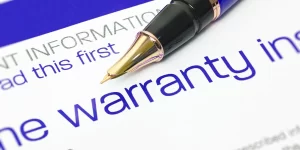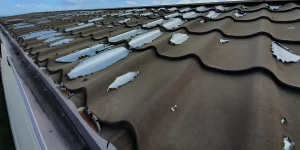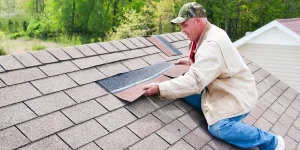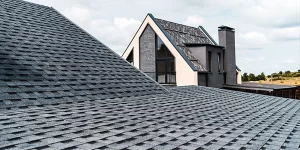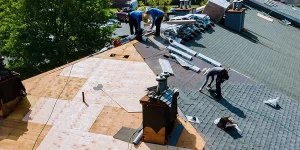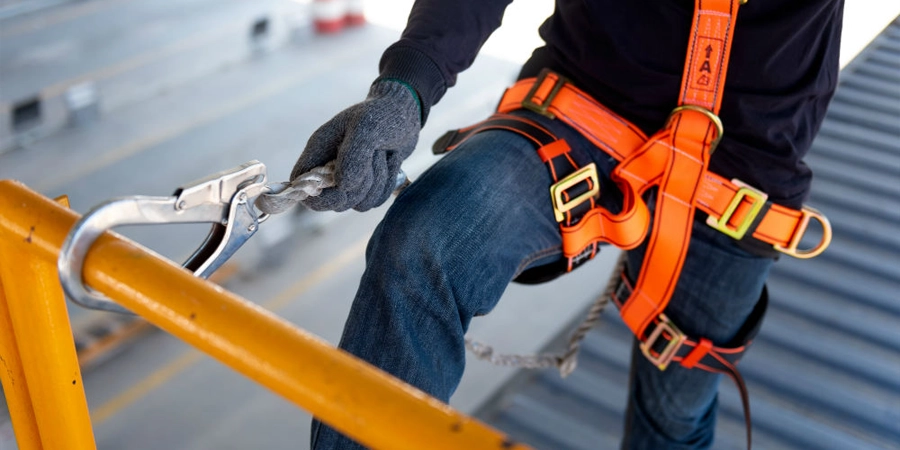Insurance Advice for Roofing Contractors
Protecting Your Business and Building Trust with Clients
As a roofing contractor, you know that the work you do is not only essential but also potentially hazardous. Ensuring the safety of your team and providing top-notch service to your clients is a priority. That’s why insurance coverage is crucial for your roofing business. Not only does it protect you and your employees, but it also builds trust with your clients. So, let’s delve into roofing contractor insurance and understand why it’s essential for your business.

3 Essential Roofing Insurance Policies
Insurance Every Roofing Contractor Should Have
Being properly insured is not just about meeting legal requirements; it’s about protecting your business and building trust with your clients. Homeowners and property owners prefer working with roofing contractors who have comprehensive insurance coverage, as it demonstrates professionalism, reliability, and a commitment to safety.
Having the right insurance also ensures that you can handle accidents and mistakes without putting your business at risk. In the roofing industry, accidents can happen despite the best precautions. Having insurance coverage tailored to your business’s needs will help you weather any storm and continue thriving.
1. General Liability Insurance
Roofing professionals understand the importance of safeguarding their business against unforeseen risks. A comprehensive insurance plan, particularly a Business Owners Policy (BOP), proves essential in this regard. While larger construction companies may need to procure separate policies for general liability, commercial property, and business interruption, smaller businesses, typically with fewer than 100 employees and generating under $5 million in revenue annually, can benefit from bundling these coverages within a BOP, resulting in cost savings.
One critical aspect covered by a general liability policy is protection in cases of third-party bodily injury. In scenarios where someone not employed by the roofing company sustains an injury at the job site, the policy would cover all associated costs. For example, general liability insurance provides financial support if a tool accidentally falls off the roof and injures a passerby.
Moreover, general liability insurance extends its protective umbrella to include slander, libel, wrongful arrest, and other reputational matters affecting the business and its owner. Additionally, customer claims pertaining to services or products advertised by the business are also covered.
Commercial property insurance is invaluable for roofing professionals with office buildings, storage facilities, or garages. This coverage ensures protection against property and equipment damage, whether the premises are owned or rented. To safeguard specialized tools and equipment essential to their operations, roofers can opt to include a “tools and equipment floater” in their coverage, encompassing purchased and rented items.
The third crucial component found in a BOP is business interruption or loss of income insurance. This coverage acts as a safety net if unforeseen circumstances force the business to temporarily shut down, preventing it from operating. In such instances, the insurance reimburses the business for the loss of income and operating expenses, typically covering up to a year of disruption.
A Business Owners Policy tailored to the roofing industry offers a comprehensive and cost-effective solution to protect against potential risks. With bundled coverages, smaller roofing businesses can confidently pursue their work, knowing they are well-prepared for any challenges.
2. Workers' Compensation Insurance
Ensuring the safety and well-being of your workforce is paramount in the roofing industry, underscoring the vital importance of including workers’ compensation insurance in your roofing insurance program.
As we’ve already highlighted, roofing poses significant risks, with a high fatality rate. Consequently, securing a comprehensive workers’ compensation policy may entail slightly higher costs compared to businesses with lower risk factors.
Having workers’ compensation insurance means that if any of your employees suffer injuries while on the job, all their medical expenses, including rehabilitation, will be covered. Additionally, the policy provides financial support by compensating for lost wages during their recovery period when they are unable to work.
In more severe incidents, workers’ compensation also extends its protection by offering disability and death benefits in the unfortunate event of a fatal injury. Furthermore, it shields your business from workers’ compensation claims, covering defense expenses and potential settlements if an injured worker decides to pursue legal action instead of accepting the benefits provided under the workers’ comp policy.
Occurrence vs. Claims-Based General Liability Insurance
Selecting the right type of General Liability Insurance is crucial for your business. Occurrence-Based Insurance covers incidents that occur during the policy period, even if the claim is submitted after the policy expires. On the other hand, Claims-Based Insurance only covers incidents that are claimed during the coverage period.
Consider your business’s past experiences and potential risks to determine which type of insurance suits you better. It’s always best to consult with an insurance professional to make an informed decision that aligns with your roofing business’s needs.
3. Surety Bonds
Although surety bonds may differ from traditional insurance policies, they play a crucial role in establishing a robust roofing insurance program that offers work guarantees.
When searching for a roofing contractor, individuals and government entities prioritize licensed, bonded, and insured professionals, as it indicates a serious commitment to their work at every stage. A surety bond functions as a legal agreement between two parties, protecting one party from financial losses if the other party fails to fulfill their agreed-upon tasks.
For roofers, obtaining a surety bond involves a meticulous process. They must submit a detailed business plan outlining the purpose of their work. Additionally, they need to provide financial assurances, such as proof of credit availability and other financial documents demonstrating adequate funding for the project. These measures establish the roofing company’s credibility within the industry and among contractors and subcontractors.
When seeking bonds, whether for bidding, performance, payment, or any other type, it is wise to consult a specialized broker with expertise in construction and roofing businesses. Such a broker understands the industry’s unique risks and can tailor coverage to suit specific needs.
Additional Roofing Insurance Coverage
While General Liability, Workers’ Compensation, and Surety Bonds are the foundational policies, there are other coverage options that may suit your roofing business:
1. Professional Liability Insurance
Although not classified as mandatory roofing insurance, it holds significant relevance for certain roofing and construction firms. Take, for instance, roofing companies that frequently engage with customers, offering expert advice on product choices, materials, and roof maintenance or repair treatments. In such cases, obtaining professional liability insurance becomes crucial.
By having this coverage, you shield yourself from potential legal claims arising from advice or recommendations provided to third parties, which led to financial losses or damages. This protection ensures that you’re safeguarded in situations where your counsel may have unintended repercussions.
2. Commercial Auto Insurance
If your roofing business involves using cars, trucks, vans, or trailers, it is crucial to invest in commercial auto insurance. Personal auto insurance won’t suffice in covering work-related damages.
With commercial auto insurance, you gain protection for third-party vehicles, and it includes personal injury coverage and medical payments for both you and your employees in case of injuries while operating work vehicles. Additionally, it covers third-party bodily injuries in accidents involving you or your workers.
Moreover, most commercial auto policies offer collision coverage, safeguarding your vehicles in the event of collisions with other vehicles. They should also provide gap coverage, which comes into play when a leased vehicle suffers severe damage, covering the remaining owed money for its replacement.
3. Builders Risk Insurance
“Guardianship during construction” insurance shields properties amidst ongoing construction or renovation projects. This comprehensive policy offers protection for structures in the process of being built or refurbished, safeguarding them from acts of vandalism, fire, or adverse weather conditions. Additionally, the coverage extends to the equipment and materials utilized on-site and during transportation.
To ensure adequate protection, property owners typically require the project’s contractor to obtain this insurance, with the added stipulation that all subcontractors involved are also adequately covered.
4. Inland Marine Insurance
If your roofing company primarily operates in a specific area with its property and equipment stationed there, a Business Owners Policy (BOP) might be sufficient for your insurance needs. However, if your business takes on projects in various distant locations and frequently transports equipment and supplies from one place to another, it’s prudent to consider investing in inland marine insurance.
Inland marine insurance is particularly crucial for businesses regularly shipping high-value items like computers, servers, laptops, networking equipment, or large construction machinery. Furthermore, there are instances where inland marine coverage can also protect property leased or loaned to your company while it’s temporarily under your possession.
Additional Insurance Coverage to Consider
There are other coverage options that may suit your roofing business:
– Tool and Equipment Insurance: As a roofing contractor, your tools and equipment are essential for your business’s success. A tool and equipment insurance policy, sometimes called a tool floater, can reimburse you if the tools you need to run your roofing business are stolen or damaged.
– Umbrella Insurance: An umbrella insurance policy provides additional coverage beyond your existing policies. It’s a wise choice if your existing policy coverage limits are lower than the risks your business may face.
– Errors and Omissions Insurance: This insurance policy protects professionals who offer advice or perform services. As a roofing contractor, it covers damages resulting from mistakes or incorrect advice during projects.
Finding the Right Insurance Coverage
Every roofing business is unique, and its insurance needs may vary. It’s crucial to consult with an insurance expert who can tailor suggestions specifically for your business. The goal is to ensure you have the right type and amount of insurance coverage to protect your business, employees, and clients.
As a roofing contractor, your dedication to excellence and safety sets you apart in the industry. Having the right insurance coverage is not just a formality but a reflection of your commitment to your craft and your clients. General Liability, Workers’ Compensation, and Surety Bonds provide the essential protection and confidence needed to run your roofing business successfully.
Investing in the right insurance will not only safeguard your business but also build trust with your clients. They will rest easy knowing they are working with a fully insured and reliable roofing contractor. So, don’t delay—protect your business and give your clients the assurance they need to entrust their roofing projects to you! 🏠🛠️


